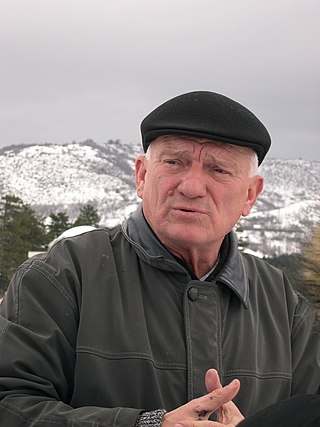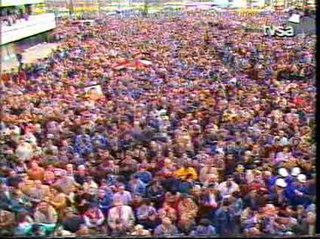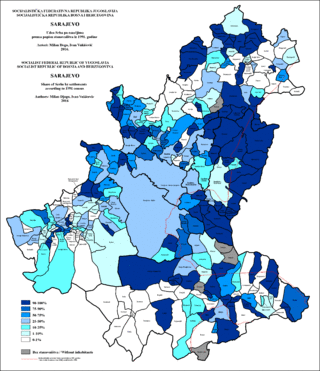Related Research Articles

Bosnia and Herzegovina, sometimes known as Bosnia-Herzegovina and informally as Bosnia, is a country in Southeast Europe, situated on the Balkan Peninsula. It borders Serbia to the east, Montenegro to the southeast, and Croatia to the north and southwest. In the south it has a 20-kilometre-long (12-mile) coast on the Adriatic Sea, with the town of Neum being its only access to the sea. Bosnia has a moderate continental climate with hot summers and cold, snowy winters. In the central and eastern regions, the geography is mountainous, in the northwest it is moderately hilly, and in the northeast it is predominantly flat. Herzegovina, the smaller, southern region, has a Mediterranean climate and is mostly mountainous. Sarajevo is the capital and the largest city.

Gavrilo Princip was a Bosnian Serb student who assassinated Archduke Franz Ferdinand, heir presumptive to the throne of Austria-Hungary, and his wife Sophie, Duchess von Hohenberg, in Sarajevo on 28 June 1914. The killing of the Archduke and his wife set off the July Crisis, a series of events that within one month led to the outbreak of World War I.

The General Framework Agreement for Peace in Bosnia and Herzegovina, also known as the Dayton Agreement or the Dayton Accords, and colloquially known as the Dayton in ex-Yugoslav parlance, is the peace agreement reached at Wright-Patterson Air Force Base near Dayton, Ohio, United States, finalised on 21 November 1995, and formally signed in Paris, on 14 December 1995. These accords put an end to the three-and-a-half-year-long Bosnian War, which was part of the much larger Yugoslav Wars.

Alija Izetbegović was a Bosnian politician, Islamic philosopher and author, who in 1992 became the first president of the Presidency of the newly independent Republic of Bosnia and Herzegovina. He later served as the first chairman of the Presidency of Bosnia and Herzegovina.

The Bosnian War was an international armed conflict that took place in Bosnia and Herzegovina between 1992 and 1995. The war is commonly seen as having started on 6 April 1992, following several earlier violent incidents. It ended on 14 December 1995 when the Dayton Accords were signed. The main belligerents were the forces of the Republic of Bosnia and Herzegovina, the Republic of Herzeg-Bosnia, and the Republika Srpska, the latter two entities being proto-states led and supplied by Croatia and Serbia, respectively.

Young Bosnia refers to a loosely organised grouping of separatist and revolutionary cells active in the early 20th century, that sought to end the Austro-Hungarian rule in Bosnia and Herzegovina.

Milorad Dodik is a Bosnian Serb politician currently serving as the 8th president of Republika Srpska since 2022, a position he previously held from 2010 to 2018. He also served as the 7th Serb member of the Presidency of Bosnia and Herzegovina from 2018 to 2022.

Jovan Divjak was a Bosnian army general who served as the Deputy Commander of the Bosnian army's general staff until 1994, during the Bosnian War.
ZaMirNET (ForPeaceNET) is a Croatia-based non-governmental organisation working in the field of ICT.

Adil Zulfikarpašić was a Bosnian intellectual and politician who served as vice president of the Republic of Bosnia and Herzegovina, during the Bosnian War of the 1990s, under the first president of the Presidency of the Republic of Bosnia and Herzegovina Alija Izetbegović. After the war he retired from politics and opened the Bosniak Institute, a museum in Sarajevo focused on the Bosniak culture.
The 1992 Yugoslav People's Army column incident in Tuzla, also known as Tuzla column was an attack on the 92nd Motorized Brigade of the Yugoslav People's Army (JNA) in the Bosnian city of Tuzla on 15 May 1992. The incident occurred at the road junction of Brčanska Malta. At least 54 soldiers of the JNA were killed and 44 wounded during the attacks. What started off as a peaceful retreat by agreement with local authorities ended in an ambush, when Patriotic League, Green Berets and Bosniaks from local police attacked the column. It was a repeat of a similar incident that occurred in Sarajevo a week prior.

Radovan Karadžić is a Bosnian Serb politician who was convicted of genocide, crimes against humanity and war crimes by the International Criminal Tribunal for the former Yugoslavia (ICTY). He was the president of Republika Srpska during the Bosnian War.

Al Jazeera Balkans (AJB) is an international news television station headquartered in Sarajevo, Bosnia and Herzegovina aimed at the media markets of the countries that used to be constituent units of SFR Yugoslavia. It is part of the Al Jazeera Media Network.
The Institute for Conflict Transformation and Peacebuilding (ICP) is a Swiss non-governmental organization specialized in the promotion of non-violent conflict transformation. Created by Pascal Gemperli and Uri Ziegele in 2007, the organization focuses on promoting conflict transformation and peacebuilding through peace mediation courses and trainings. Its comprehensive approach is based on interdisciplinary practice and research in the areas of international peace and conflict research, critical systems theory, culture and communication studies, political psychology, group psychotherapy and other related fields. The ICP has offices in both Bern and Morges (Switzerland). It is accredited ECOSOC and certified EDUQUA. It is active in the following countries: Switzerland, Serbia, Bosnia and Herzegovina, Croatia, Morocco, Azerbaijan and Armenia.

On 5 April 1992, in response to events all over Bosnia and Herzegovina 100,000 people of all nationalities turned out for a peace rally in Sarajevo. Serb Democratic Party (SDS) snipers in the Holiday Inn in the heart of Sarajevo opened fire on the crowd, killing six people and wounding several more. Suada Dilberović and an ethnic Croat woman Olga Sučić were in the first rows, protesting on the Vrbanja bridge at the time. The bridge on which Sučić and Dilberović were killed was later renamed in their honor. Six SDS snipers were arrested, but were exchanged when the SDS threatened to kill the commander of the Bosnian police academy who had been captured the previous day, after the Serb paramilitaries took over the academy and arrested him.

The Post-Conflict Research Center (PCRC) is a Sarajevo-based non-governmental organization, which aims to nurture an enabling environment for sustainable peace and facilitate the restoration of inter-ethnic relationships in Bosnia-Herzegovina. PCRC's expertise consists of innovative multimedia projects and creative educational curricula that engage youth in fostering long-lasting tolerance, mutual understanding, and social activism in the Western Balkans region. The Center’s overall mission is to build a robust network empowering youth with transferable skills and resources to spread an all-encompassing culture of peace among the many ethnic groups composing the country. PCRC’s overall strategy encompasses six core areas of operation: creative multimedia, preventing genocide, mass atrocities & violent extremism, peace education, transitional justice, post-conflict research and consultancy.
Croatian National Council in Bosnia and Herzegovina is a Sarajevo-based NGO and a civic organisation of Bosnian Croats.

The Exodus of Sarajevo Serbs was the migration of ethnic Serbs from Sarajevo, the capital of Bosnia and Herzegovina, between January and March 1996 after the Dayton Agreement that concluded the Bosnian War (1992–95).
Anarchism in Bosnia and Herzegovina first emerged from left-wing currents of the anti-imperialist movement, gaining traction as a tendency in the revolutionary organization Young Bosnia. Following assassination of Archduke Franz Ferdinand and World War I, Bosnia and Herzegovina was brought under a series of authoritarian regimes, before gaining independence in 1992. In the post-independence climate of rising nationalism and income inequality, anarchism re-emerged as part of the nascent anti-nationalist and anti-capitalist movements of the 21st century.
The Initiative for RECOM, full name Initiative for the establishment of a Regional Commission tasked with establishing the facts about all victims of war crimes and other serious human rights violations committed on the territory of the former Socialist Federal Republic of Yugoslavia in the period from January 1, 1991, to December 31, 2001, was an initiative to establish a regional commission for truth by agreement between the states of the former Socialist Federal Republic of Yugoslavia.
References
- 1 2 "about CNA Sarajevo Belgrade". CNA. 2011-11-11. Retrieved 2020-06-14.
- 1 2 "Centre for Nonviolent Action, Balkans - Irénées". www.irenees.net. Retrieved 2020-06-14.
- ↑ Vukosavljevic, Nenad. Training for Peacebuilding and Conflict Transformation. Experiences of the "Centre for Nonviolent Action" in the Western Balkans. Berghof Research Center for Constructive Conflict Management.
- 1 2 3 4 5 6 7 Fischer, Martina (2006). Peacebuilding and Civil Society in Bosnia-Herzegovina: Ten Years After Dayton. LIT Verlag Münster. pp. 387–393.
- ↑ "about trainings". CNA. 2011-11-21. Retrieved 2020-06-14.
- 1 2 Caucaso, Osservatorio Balcani e. "Sarajevo: the road to nonviolence". Osservatorio Balcani e Caucaso (in Italian). Retrieved 2020-06-14.
- 1 2 3 4 5 6 7 8 "film | CNA" . Retrieved 2020-06-14.
- 1 2 3 4 5 "Documentaries by the Center for Nonviolent Action – Learning history that is not yet history" . Retrieved 2020-06-14.
- ↑ CNA (2019-12-13). "Centre for Nonviolent Action among the Winners of the Krunoslav Sukić Award |". CNA. Retrieved 2020-06-14.